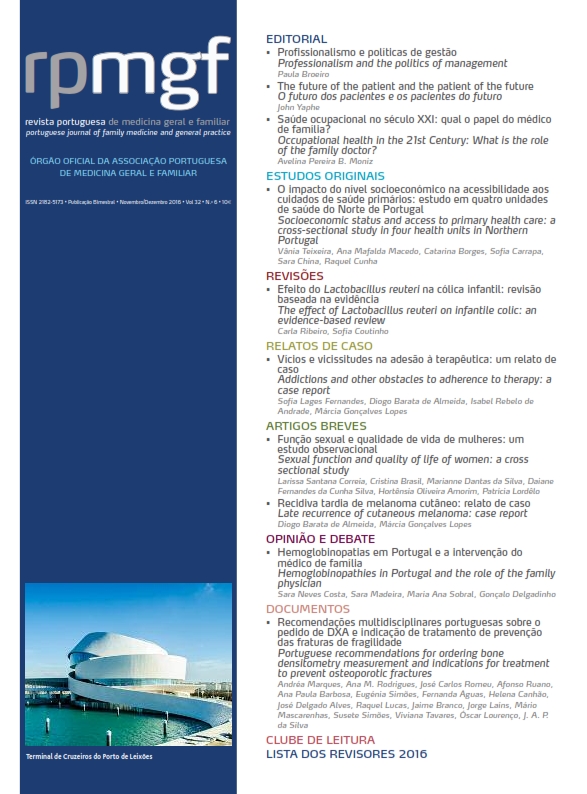Portuguese recommendations for ordering bone densitometry measurement and indications for treatment to prevent osteoporotic fractures
DOI:
https://doi.org/10.32385/rpmgf.v32i6.11964Keywords:
Risco de Fratura, FRAX, Osteoporose, DMO, DXA, Fraturas de Fragilidade, Orientações, RecomendaçõesAbstract
Objective: To establish Portuguese recommendations regarding the indications for ordering bone densitometry measurement to (DXA) and for starting treatment to prevent osteoporotic fractures. Methods: A multidisciplinary panel, representing a wide range of medical specialties and patient associations related to osteoporosis, as well as national experts in this field and in health economics, met to develop recommendations based on available evidence and expert consensus. Recently obtained data on the epidemiologic, economic and quality-of-life aspects of osteoporotic fractures in Portugal were used to support decisions. Results: Ten recommendations were developed covering the issues of indications for ordering DXA measurements and whom to treat with anti-fracture medications. Thresholds for assessment and intervention are based on the cost-effectiveness analysis of interventions at different thresholds of a ten-year probability of osteoporotic fractures, calculated with the Portuguese version of FRAX® (FRAX®Port), and taking into account Portuguese epidemiologic and economic data. Limitations of FRAX® are highlighted and guidance for appropriate adjustment is provided, when possible. Conclusions: Cost-effectiveness thresholds for DXA examination and drug intervention aiming at fragility fracture prevention are provided for the Portuguese population. These are practical, based on national epidemiological and economic data, evidence-based, and supported by a multidisciplinary panel of experts and scientific societies. Implementation of these recommendations has the possibility to assure the most effective use of health resources in the prevention of osteoporotic fractures in Portugal.Downloads
Downloads
Published
Issue
Section
License
The authors will assign to the RPMGF the sole right to publish and distribute the content of the manuscript specified in this declaration via physical, electronic, broadcasting or any other medium that may come into existence. They also grant the RPMGF the right to use and exploit this manuscript, in particular by assigning, selling or licensing its content. This permission is permanent and takes effect from the moment the manuscript is submitted, has the maximum duration allowed by applicable Portuguese or international law and is of worldwide scope. The authors further declare that this assignment is made free of charge. If the RPMGF informs the authors that it is not going to publish their manuscript, the exclusive assignment of rights ceases forthwith.
The authors authorise the RPMGF (or any entity it may appoint) to act on their behalf when it believes that copyright may have been infringed.





